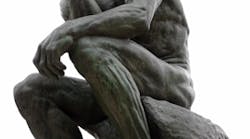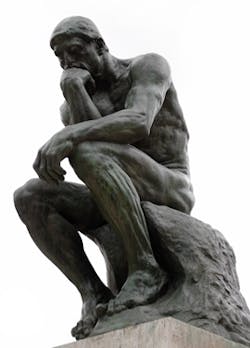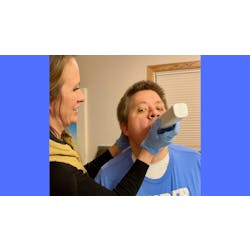By Kristine Hodsdon, RDH, MSEC
The quest for the meaning of life is as old as civilization. In the Western philosophical tradition, Greeks were among the first thinkers to pursue these values. Socrates' well-known "Know thyself" saying is familiar to many of us, as is Plato's claim that "An unexamined life is not worth living." Eastern philosophers such as the Buddha and Confucius pursued the same basic quest for the meaning of life.
In the 20th century, philologists and existential philosophers have reviewed this issue with studies into optimal human functioning, transcendent experiences, individuation, maturity, and human potential. More recently, some psychologists and management scholars have explored the question of meaning in life and meaning in work. This article draws primarily upon current theories to explore the range of meaning.
The social sciences call for a better comprehension of meaning-in-life models, and the subject of meaning in life is missing relative to the dental profession. Two hygienists, for example, work alongside each other in an open-concept hygiene suite. A child walks by and asks what they are doing. The first hygienist replies, "Cleaning and polishing teeth, and it is what I do every day. All I do is scrape, tell patients to floss and rinse, and input notes in the computer."
The other hygienist smiles, proudly proclaiming, "I'm positively impacting a person's overall health!" This is the difference between dental hygiene professionals focusing on "what" they are doing instead of "why" they are doing it. Yet, it is difficult to feel passionate about something when one is missing the meaning behind it, such as providing care.
How an individual defines meaning has as much to do with his or her mindset as it does with personal, philosophical, cultural, religious, and scientific beliefs. Defining meaning in work and life is not about the daily tasks; it is about the reason for the tasks. Discovering meaning allows an individual to create the understanding behind the tasks, and knowing that purpose can dramatically change experiences. By understanding one's own meaning, one is able to transform perceptions of daily reality and become aware of one's part in creating it.
Meaning in Life
Many have thoughts about the importance of having meaning in life, or the consequences of having a meaningless life. In 2007, Gallup asked respondents in 84 countries the following question: "Do you feel your life has an important meaning or purpose?" More than 80% of 1,000 adult respondents said their lives have an important meaning or purpose (Crabtree and Pelham, 2008). Despite this perception of importance, there seems to be no consensus on a definition or a unified formula to achieve a meaningful life.
-------------------------------------------------------
Other articles by Hodsdon
- Director's Message: Show me the money!
- Director's Message: Whose fault is it anyway — no shows and cancellations?
- Director's Message: What do you say to 'Insurance won’t cover that'?
-------------------------------------------------------
The varying interpretations and explanations seem to arise because of the different ways researchers view and intuitively understand meaning in life. Physiology, career statistics, and human spirituality are among the influential factors behind academic interpretations. Additionally, different terms are used when referring to meaning in life. The author identified various representations of meaning of life throughout the literature, including meaning in life, meaningful life, meaning of life, meaning-making, meaning orientation, personal meaning, a good life, and will to meaning. Concurrently, various scholars propose a multitude of ingredients that create meaning in life.
Despite these different approaches and definitions, many scholars have measured the effect of meaning in life on subjective well-being. Wide research has demonstrated that people with a strong sense of meaning and purpose in life experience greater happiness, fewer psychological problems, and live longer lives.
Meaning and Work
Similar in scope to the meaning in life research, the meaning in work literature is stretched across various disciplines. Researchers have undertaken the study of the search for meaning in work because work and workplaces are critical areas in adult lives. Meaning in work theories grew out of the need to help workers in their search for meaningful professions or occupations.
Researchers showed that employment theories were derived from psychodynamic philosophies and originally came from the perspective that a career is detached from the whole person. Meaning is missing when the individual perceives him- or herself to be trapped in a job or when he or she is unemployed. Individuals strive to find meaningful lives, and meaning can be found in their work. A meaning in work may help individuals in their search for a good life.
Psychologists agree that individuals may find meaning from a variety of sources and life experiences. There are three different work orientations that affect disposition in finding meaningfulness in work:
- Job: Work is a source of material benefits enabling other parts of life. The meaning of work is primarily what it contributes to outside domains of life.
- Career: Work is a source of advancement, prestige, and status.
- Calling: Work is an end in itself, with a belief that it contributes to the greater good.
A dental hygienist who sees work as making patients healthier vs. cleaning teeth could have a calling orientation. Empirical findings have also shown that viewing one's career as a calling is linked with life meaning and work meaning.
Coaching
Coaching is a developing theoretical and applied field of practice. There is a combination of disciplines that contribute to the coach field. These include management, psychology, education, philosophy, social sciences, and adult learning theories. Coaching can support an individual's move from awareness to responsibility, from action to results. The contexts of coaching vary, and the genres are often distinguished between executive, skills and capabilities, developmental, transformational, team, business, career, and life coaching.
Coaching emerged from the theories of humanistic aspects of psychology -- the human potential movement (HPM). Key influencers were Werner Erhard and Thomas Leonard. Concurrently, within the field of psychology, a shift was occurring toward positive and growth-oriented approaches to human behaviors that were coming into alignment with the societal trends of health and well-being vs. disease and illness. Juxtapose these events with the HPM unfolding within the public sector to explain the popularization of "life" coaching by modern gurus and self-elected experts outside of the academic setting. These pop culture coaches were accused of academic incoherence, relaying non-evidenced-based premises and promises, irresponsibility, pseudo-scientific materials, and tools for general consumer consumption.
Nevertheless, what does emerge from the life-coaching research is that life coaching is about virtually any area in a person's life and supports the realization of, clarification of, and/or progress toward meaningful life goals while enhancing an individual's well-being. The mechanisms of life coaching include cognitive, emotional, and behavioral changes that facilitate goal attainment and the enhancement of performance and well-being in one's overall life. Life coaching helps individuals develop future visions, identify desired outcomes, establish specific personal goals, increase their motivation by identifying strengths and building self-efficacy, identify resources and formulate action plans, monitor and evaluate progress, and modify action plans. Research shows that participation in the coached approach is associated with higher levels of goal attainment; lower levels of depression, stress, and anxiety; higher levels of insight; improved satisfaction; and meaning in life and work.
7 Methods for Meaning
Developing meaning is holistic, complex, and multidimensional. It involves an individual's beliefs, actions, self-awareness, and life and work environments. It is experiencing life events, a self-assigning of values and purpose, and it is relational. An orientation is a mindset, a frame of reference, and a set of values and beliefs. A person's meaning is expressed in desires, priorities, and preferred work environment. Seven objectives for accessing a meaningful life are:
- Discover the purpose and direction of your life.
- Understand who you are, and why you are here.
- Know and examine what matters.
- Have a sense of freedom and responsibility to do what is right.
- Become authentic and kind in relating to others.
- Develop the resilience to survive anything life throws at you.
- Live a vital and fulfilling life in all circumstances.
Consider a typical child's toy, the kaleidoscope. The kaleidoscope operates on the concept of multiple reflecting mirrors. When the kaleidoscope's tube turns, the tumbling of colored glass pieces or pebbles against those mirrors presents the viewer with a variety of intriguing shapes and images. As a result, a seemingly infinite number of color combinations, forms, and patterns can be created with every turn of the tube.
Likewise, the definition of meaning in life changes and shifts as a person moves through life circumstances and strives toward a goal or goals in creating a meaningful life. It is the interpretation of this author that each of us has a role, a meaning for our lives. Various other fields of study have clearly benefited from a broad understanding of factors contributing to the meaning of life, meaning of work, and coaching. It is this author's premise that the fields of dentistry and dental hygiene can equally benefit.
Kristine A. Hodsdon, RDH, MSEC, wrote this article for her 2013 capstone project from the University of Charlotte-McColl School of Business, titled "Coaching for Meaning: Purpose-Centered Health Professionals." References are available upon request. Kristine is available to speak with you one-on-one about your business/career and create an individualized plan from the inside out. She can be reached at [email protected].
Past RDH Issues







